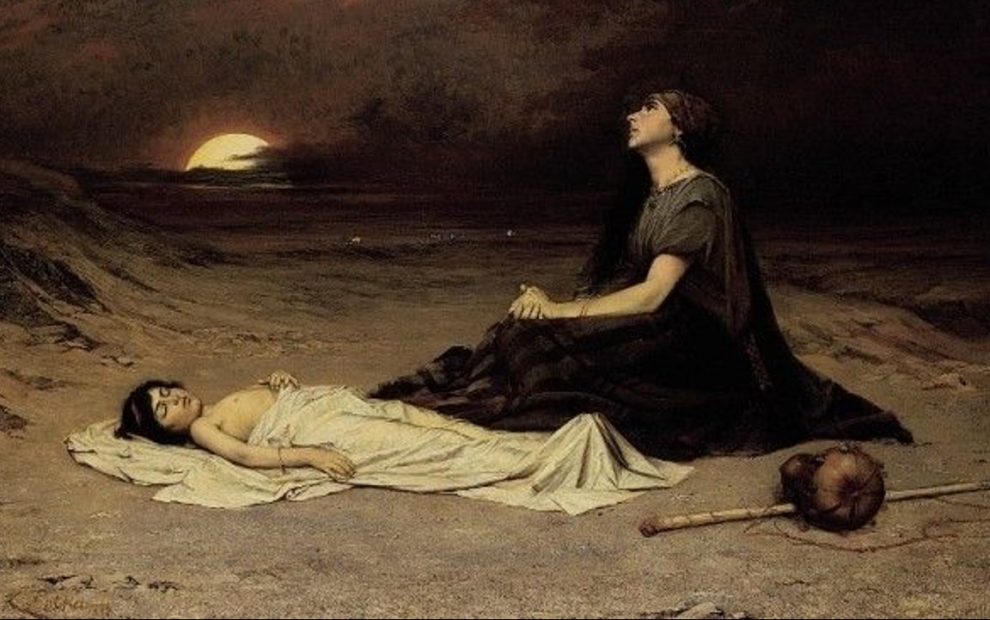The knife was in his mouth pirate style, the serrated blade turned inward. “No, no, no!” I cried.
When I gently pulled the sharp object from my toddler’s lips, I was relieved not to see any blood, but I was appalled. Shame washed over me. How could I have been so careless?
Unfortunately, this wasn’t the first time something like this had happened. After a string of life-threatening health crises during my pregnancy, I had been severely sick during the postpartum period, with a disabled body and a mind riddled with post-traumatic stress disorder (PTSD).
One of the symptoms I regularly experience is hypervigilance. Ironically, as I become exhausted by constantly looking for imagery threats, I sometimes miss actual dangers. It’s hard to accept God’s grace when I’ve unintentionally put my child at risk. But I’m reaching for God’s goodness. I know the God who walked with me through mental illness before.
Years before I developed PTSD, I was heavy with anxiety. I grew up in a culture that called worry a sin, and so, in my imagination, being a worrier was as bad as gossiping or lying, as bad as being a warty-faced cartoon witch. Later, in my thirties, I renamed my anxiety with a more palatable term: stress. But my stress became consuming.
Unable to neglect my mental health any longer, I made radical lifestyle shifts. Each day, I processed my emotions with God, which helped me to find joy. In addition, I worked with a Christian therapist and gained healthy coping skills to emotionally regulate. I learned how to get to the roots of my anxiety, bringing the power of truth to specific lies I believed.
Although all this made a significant difference, I still wasn’t emotionally whole. Regardless of the root causes, my brain was too accustomed to the shape of anxiety; it was a familiar, deeply dug rut into which my thoughts so easily fell. Worry clawed at my mind for no decipherable reason; prayer could not always dissolve the tension. Even my hormones could make my nerves buzz, my heart pound, my shoulders tighten, and my mind scatter. The same biology designed to protect me went into overdrive, misaligned. When this happened, anxiety held my mind and body captive.
I found hope for my anxiety through the biblical story of Hagar, whose life was also shaped by powers outside her control (albeit of a very different type). According to Genesis, Hagar was the enslaved Egyptian maidservant of Sarai, wife of the patriarch Abram. When Abram and Sarai had no children, despite God’s promises to them, Sarai persuaded Abram to take Hagar as his concubine, in the hopes she would bear an heir. However, when Hagar did become pregnant, Sarai was jealous and began mistreating her. Finally, to escape Sarai’s abuse, Hagar fled into the desert. There, an angel of the Lord appeared and persuaded Hagar to return to Sarai and Abram, promising she would bear a son, Ishmael. Hagar then gave a name to the One who spoke to her in the desert: “You are God-Who-Sees-Me.”
Ten or fifteen years later, after Abram and Sarai were renamed Abraham and Sarah, Isaac was born to Sarah in her old age. Then, Sarah began to view Ishmael as a threat. To ensure Abraham’s inheritance for her own child, Sarah insisted that her husband send both Hagar and Ishmael away.
Once again, Hagar found herself in the desert, but this time Ishmael was with her. It didn’t take long for their water to run out. Hagar cried out in despair, for she knew they were doomed—and again, the Divine was there with her. This time, after helping her find a well of water, God promised that her son would also father a great nation.
Despite how inconsequential Hagar was in her society as an enslaved and outcast minority woman, God faithfully found her in her distress. Both times, God saw her, and God was there, even when she had nearly given up.
If God could meet Hagar in the desert, I realized, surely God could meet me too. I finally gave up fighting the crushing power of anxiety. But I wasn’t going to wave my white flag, sinking under the tides of fear, either. Instead, I surrendered to the One who controls the storms, and I asked God to stay with me amid my emotional turmoil.
It changed everything. I discovered that God didn’t need me to do better, be better, read my Bible more, or pray harder. My performance of spiritual disciplines would never be enough—but somehow, my weakness was. I claimed for myself the same words Paul received when he begged God to remove his own “thorn”: “My grace is all you need. My power works best in weakness” (2 Corinthians 12:7 NLT).
Like Hagar, who, after her rescue from the wilderness, gave God a name, I experienced a side of God I hadn’t known before: my anchor in the storm of mental illness. Now I too had a new name for the Divine: God-Who-Meets-Me in anxiety.
Too many Christians have believed that with enough faith, we can just make every type of suffering, including mental illness, miraculously dissipate. This misconception then makes God’s goodness dependent on answered prayers and our own freedom from pain. But that is a limited perspective on divine love. What if, we, like Hagar, didn’t expect God to remove every difficult thing from our lives? What if instead, we simply rested in the confidence that our stories matter to the God of the Universe?
Honestly, I’m uncomfortable with some aspects of Hagar’s story. I don’t like that when she is out in the wilderness the first time, God sends her back to her abusive mistress. But perhaps this saved her life and the life of her child. After realizing that God saw her, Hagar had enough strength to face injustice, even without any assurance her suffering would be reduced. Her hope was built on the confidence that God knew her story’s future.
Before, when I read that Jesus said, “So don’t worry” (Matthew 6:25–34), I thought he was giving a command, one that was impossible for me to obey because of my general anxiety and PTSD. Now I view this portion of scripture as an invitation to walk into trust. Wild birds soar through the air, confident they will find their next meal, even though no human feeds them; spring’s wildflowers unfold from the earth with the expectation they’ll be stylishly dressed, through no effort of their own; and Hagar, despite the human challenges of her life, had divine hope for the future. Each of us—like those birds and flowers, like Hagar—is also seen and cared for.
With treatment and support, my symptoms are slowly decreasing. But I still need theGod-Who-Meets-Me. This God meets me in trauma . . . in hypervigilance . . . in insomnia . . . and in PTSD flashbacks. Each morning, I implore God to empower me with grace in all my weaknesses. Then, as each of life’s waves builds and crests, God and I ride it together.
I don’t know what mental health struggles you have or what steps you’ve taken to free yourself from them. But I extend to you Jesus’ invitation: Don’t worry. Trust that Jesus sees you, in all your strengths and weaknesses. Settle in the confidence that he knows your story. Discover the God-Who-Meets-Us, wherever we are.
Image: Wikimedia Commons/Hagar and Ishmael in the Desert, Emanuel Krescenc Liska, 1883













Add comment